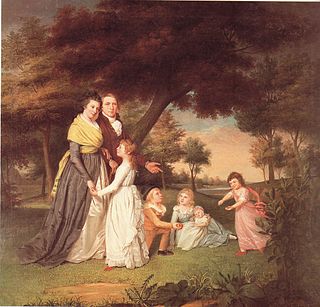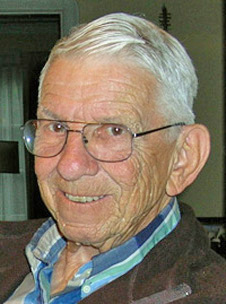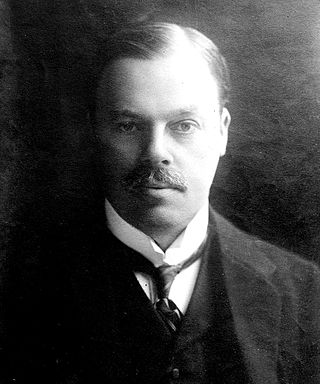Related Research Articles

The Federalist Party was a nationalist American political party and the first political party in the United States. It dominated the national government under Alexander Hamilton from 1789 to 1801. The party was defeated by the Democratic-Republican Party in 1800, and it became a minority party while keeping its stronghold in New England. It made a brief resurgence by opposing the War of 1812, then collapsed with its last presidential candidate in 1816. Remnants lasted for a few years afterwards.

Jeffersonian democracy, named after its advocate Thomas Jefferson, was one of two dominant political outlooks and movements in the United States from the 1790s to the 1820s. The Jeffersonians were deeply committed to American republicanism, which meant opposition to what they considered to be artificial aristocracy, opposition to corruption, and insistence on virtue, with a priority for the "yeoman farmer", "planters", and the "plain folk". They were antagonistic to the aristocratic elitism of merchants, bankers, and manufacturers, distrusted factory workers, and strongly opposed and were on the watch for supporters of the Westminster system.

The American Historical Association (AHA) is the oldest professional association of historians in the United States and the largest such organization in the world. Founded in 1884, AHA works to protect academic freedom, develop professional standards, and support scholarship and innovative teaching. It publishes The American Historical Review four times annually, which features scholarly history-related articles and book reviews.

The values and ideals of republicanism are foundational in the constitution and history of the United States. As the United States constitution prohibits granting titles of nobility, republicanism in this context does not refer to a political movement to abolish such a social class, as it does in countries such as the UK, Australia, and the Netherlands. Instead, it refers to the core values that citizenry in a republic have, or ought to have.

"Republican Motherhood" is an 18th-century term for an attitude toward women's roles present in the emerging United States before, during, and after the American Revolution. It centered on the belief that the patriots' daughters should be raised to uphold the ideals of republicanism, in order to pass on republican values to the next generation. In this way, the "Republican Mother" was considered a custodian of civic virtue responsible for upholding the morality of her husband and children. Although it is an anachronism, the period of Republican Motherhood is hard to categorize in the history of feminism. On the one hand, it reinforced the idea of a domestic women's sphere separate from the public world of men. On the other hand, it encouraged the education of women and invested their "traditional" sphere with a dignity and importance that had been missing from previous conceptions of women's work.
Carl Neumann Degler was an American historian and Pulitzer Prize-winning author. He was the Margaret Byrne Professor of American History Emeritus at Stanford University.

The First Party System was the political party system in the United States between roughly 1792 and 1824. It featured two national parties competing for control of the presidency, Congress, and the states: the Federalist Party, created largely by Alexander Hamilton, and the rival Jeffersonian Democratic-Republican Party, formed by Thomas Jefferson and James Madison, usually called at the time the Republican Party.
Joyce Oldham Appleby was an American historian. She was a professor of history at UCLA. She was president of the Organization of American Historians (1991) and the American Historical Association (1997).

David Brion Davis was an American intellectual and cultural historian, and a leading authority on slavery and abolition in the Western world. He was a Sterling Professor of History at Yale University, and founder and director of Yale's Gilder Lehrman Center for the Study of Slavery, Resistance, and Abolition.
Mary Beth Norton is an American historian, specializing in American colonial history and well known for her work on women's history and the Salem witch trials. She is the Mary Donlon Alger Professor Emeritus of American History at the Department of History at Cornell University. Norton served as president of the American Historical Association in 2018. She is a recipient of the Ambassador Book Award in American Studies for In the Devil's Snare: The Salem Witchcraft Crisis of 1692. Norton received her Bachelor of Arts at the University of Michigan (1964). The next year she completed a Master of Arts, going on to receive her Ph.D. in 1969 at Harvard University. She identifies as a Democrat and she considers herself a Methodist. Mary Beth Norton is a pioneer of women historians not only in the United States but also in the whole world, as she was the first woman to get a job in the department of history at Cornell University.

Gerda Hedwig Lerner was an Austrian-born American historian and woman's history author. In addition to her numerous scholarly publications, she wrote poetry, fiction, theatre pieces, screenplays, and an autobiography. She served as president of the Organization of American Historians from 1980 to 1981. In 1980, she was appointed Robinson Edwards Professor of History at the University of Wisconsin-Madison, where she taught until retiring in 1991.

Merrill Monroe Jensen was an American historian, whose research and writing focused on the ratification of the United States Constitution. His historical interpretations are generally considered to be of the "Progressive School" of American history, the most famous exponent of which was Charles A. Beard. Jensen was a professor of history at the University of Washington (1935–1944), where he was editor of Pacific Northwest Quarterly, and the University of Wisconsin–Madison (1944–1976).

Charles Grier Sellers Jr. was an American historian. Sellers was best known for his book The Market Revolution: Jacksonian America, 1815–1846, which offered a new interpretation of the economic, social, and political events taking place during the United States' Market Revolution.
Jacquelyn Dowd Hall is an American historian and Julia Cherry Spruill Professor Emerita at the University of North Carolina at Chapel Hill. Her scholarship and teaching forwarded the emergence of U.S. women's history in the 1960s and 1970s, helped to inspire new research on Southern labor history and the long civil rights movement, and encouraged the use of oral history sources in historical research. She is the author of Revolt Against Chivalry: Jessie Daniel Ames and the Women’s Campaign Against Lynching;Like a Family: The Making of a Southern Cotton Mill World and Sisters and Rebels: The Struggle for the Soul of America.

The Harold Vyvyan Harmsworth Professorship is an endowed chair in American history at the University of Oxford, tenable for one year. The Harmsworth Professorship was established by Harold Sidney Harmsworth, 1st Viscount Rothermere (1868–1940) in memory of his son Harold Vyvyan Alfred St George, who was killed in the First World War, and whose favourite subject was history. Lord Rothermere also established a Harmsworth Professorship in imperial and naval history at Cambridge University in honour of his son Vere, who was killed in the same war. The King Edward VII Professor of English Literature at Cambridge University was endowed by Sir Harold Harmsworth in memory of King Edward VII, who died in 1910.

Peter S. Onuf is an American historian and professor known for his work on U.S. President Thomas Jefferson and Federalism. In 1989, he was named the Thomas Jefferson Memorial Foundation Professor of the University of Virginia, a chair he held until retiring in 2012. The chair's previous occupants included Jefferson biographers Dumas Malone and Merrill D. Peterson; he was succeeded by Alan Taylor.
Carroll Smith-Rosenberg is an American academic and author who is the Mary Frances Berry Collegiate Professor of History, American Culture, and Women's Studies, emerita, at the University of Michigan, Ann Arbor.
Kathryn (Kitty) Kish Sklar is an American historian, author, and professor. Her work focuses on the history of women's participation in social movements, voluntary organizations, and American public culture.
Vicki Lynn Ruiz is an American historian who has written or edited 14 books and published over 60 essays. Her work focuses on Mexican-American women in the twentieth century. She is a recipient of the National Humanities Medal.
Willie Lee Rose was an American historian. She was a professor of American History at Johns Hopkins University, and the author of several books about slavery and the Reconstruction Era.
References
- ↑ www.historians.org
- ↑ "Alice Kessler-Harris, Linda K. Kerber Biography, American Historical Association, 2007" . Retrieved 3 March 2021.
- ↑ Kerber, Linda K. (1970). Linda Kerber, Federalists in Dissent: Imagery and Ideology in Jeffersonian America. ISBN 9780801405600.
- ↑ WAWH History, Western Association of Women Historians. "Western Association of Women Historians". Western Association of Women Historians. Retrieved 2024-05-21.
- ↑ "Alice Kessler-Harris, Linda K. Kerber Biography, American Historical Association, 2007" . Retrieved 3 March 2021.
- ↑ Kerber, Linda K. "The Stateless as the Citizen's Other: A View from the United States". American Historical Association. Retrieved 17 July 2009.
- ↑ "Distinguished UI Historian Elected to Council of American Philosophical Society" . Retrieved 3 March 2021.
- ↑ "American Academy of Arts and Sciences, Member: Linda Kerber" . Retrieved 3 March 2021.
- ↑ Linda K. Kerber, Department of History, Iowa University Archived 2009-10-05 at the Wayback Machine
- ↑ "Signs: Journal of Women in Culture and Society: Editorial Board" . Retrieved 3 March 2021.
- ↑ "AHA Awards and Prizes | AHA".
- ↑ "AHA Awards and Prizes | AHA".